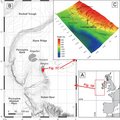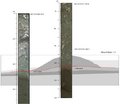Page path:
- Departments
- Department of Biogeochemistry
- Biogeochemistry Group
- People
- Tim Ferdelman
- Research
- Former Projects
- The Sub-seafloor Ocean
- IODP Expedition 307 Porcupine Carbonate Mounds
IODP Expedition 307 Porcupine Carbonate Mounds
Cold-water coral Mounds and IODP Expedition 307
In June 2005, I sailed as co-chief scientist on IODP Expedition 307 Porcupine Basin Carbonate Mounds. Geophysical surveys have revealed that upward of a thousand deep-water coral mounds lie completely or partially buried in the siliclastic sediments along the slope of the Porcupine Seabight at water depths between about 600 and 900 mbsl. The mounds rest on erosional surfaces observed in high-resolution seismic profiles, and form conical bodies reaching the width over several km and the height over 100 to 200 meters height, covered with living and/or dead cold-water corals. Of great interest is the role of microbial communities in carbonate formation and dissolution processes within the mound sediments. IODP Expedition 307 drilled the Challenger Mound in the Porcupine Seabight (SW Ireland continental margin) with the goal of unveiling the origin and depositional processes of one of these intriguing sedimentary structures. A particular task on Expedition 307 was to coordinate the geochemistry and microbiological aspects of the Expedition’s scientific goals.
For information on Expedition 307 (including a list of 307 publications) , please go to IODP Expedition 307 website.
In a related project we participated in the ESF Eurodiversity sponsored project MicroSYSTEMS Microbial diversity and fuctionality in cold-water coral ecosystems . In this project we examined biogeochemical processes in recent Norwegian and Cadiz (Pen Duick) cold-water coral reefs and mounds. This research formed the basis of Laura Wehrmann's doctoral dissertation and includes papers appearing in Biogeosciences and Marine Geology.
For information on Expedition 307 (including a list of 307 publications) , please go to IODP Expedition 307 website.
In a related project we participated in the ESF Eurodiversity sponsored project MicroSYSTEMS Microbial diversity and fuctionality in cold-water coral ecosystems . In this project we examined biogeochemical processes in recent Norwegian and Cadiz (Pen Duick) cold-water coral reefs and mounds. This research formed the basis of Laura Wehrmann's doctoral dissertation and includes papers appearing in Biogeosciences and Marine Geology.

